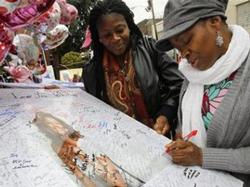We also see the debate on how to handle Houston’s very public struggles with drugs and destructive behaviors. Some have suggested that Houston’s fans would be angry if the media focused on the negative side of her life instead of the positives of her remarkable career and the uniqueness of her talent. Others argue that by glossing over things like prescription drug abuse that we are ignoring serious problems in the entertainment industry and perhaps across society as a whole.
Frankly, the fans have every right be mad to see the focus shift to Houston’s personal problems instead of her public contributions. To dredge up all her difficulties at this juncture is disrespectful not just of Houston, but of the fans themselves. While we have a societal norm that says “don’t speak ill of the dead, ” being a celebrity often appears to mean that you have forfeited your right to that level of social nicety. But the loss of Houston is not just a private event. It is a public event as well, a shared experience, and her work was a meaningful part of many lives.
When Michael Jackson died, I wrote that these kinds of cultural losses are a little like garage sales – they force us to examine, evaluate and

even give away little pieces of our lives. With music artists, the loss is often painful and profound because music has an extraordinary ability to reach people in a very unique way compared to other kinds of art because music is entirely mobile and imminently sharable.
Actors can give a stellar and moving performance, but it lives in the theater, on the DVD or in the TV. Painters can create great works of art, but they hang on a wall. We can, and do, remember and relive all kinds of art and discuss them with our friends.
Music like Houston’s defines us. We don’t just listen to it, we live it.
But music knows no boundaries, now more than ever blurring lines of social technologies. We attend concerts to see favorite artists live, but we also listen to music alone. Music is a backdrop for all kinds of experiences, from films, parties and dancing in clubs. We have it when we travel and we physically move to it dancing and exercising. Sometimes we hear music in extraordinarily mundane places, like elevators, retail stores, and shopping malls. Music is part of our lives; we come to own it. For iconic artists like Houston, Michael Jackson, Elvis Presley or John Lennon, we know their music with our whole bodies. Music often defines our experience; we live it. People commemorate events and even relationships with music. You hear “that’s our song” a lot, but rarely, “that’s our movie.”
So dishing on Houston’s personal problems mean disrespecting the meaning her music gave our lives. It makes fans angry because it devalues the their life experiences. Let people grieve. With social technologies, people can make their appreciation for Houston public and shared. They were able to attend the funeral virtually through live-streaming and could reap the psychological benefit of emotional expression and virtual social support.

Once the grieving is past, we can use Houston’s life as both a cautionary tale and a call to arms. People take comfort at these times in their religious faith and they also look for who to blame on the physical plane. Humans always want to understand why something happened. We can’t stand chaos, randomness, and uncertainty. We ask why so we can feel better, so we can make sense out of the things that happen. We feel better if we can say, oh well, her doctors did this or she did that. We want to feel that the world makes sense, that what we do matters and we like to believe there is a grand plan.
But letting the love flow now isn’t ignoring the problems in Houston’s life. Her problems were personal struggles. Her impact is public. Let people celebrate what she gave to the music world, to popular culture, to the people who aspired to sing like her, and to the events that her music helps us recall so vividly.
Today we celebrate. Tomorrow, or the next day, or whenever we’re ready, we can look for answers.
–
Previously posted on Psychology Today in Positively Media
Photo sources: Phillippine fan: UK Guardian, Dennis M. Sabangan/EPA; US fans preparing for funeral: Fox

